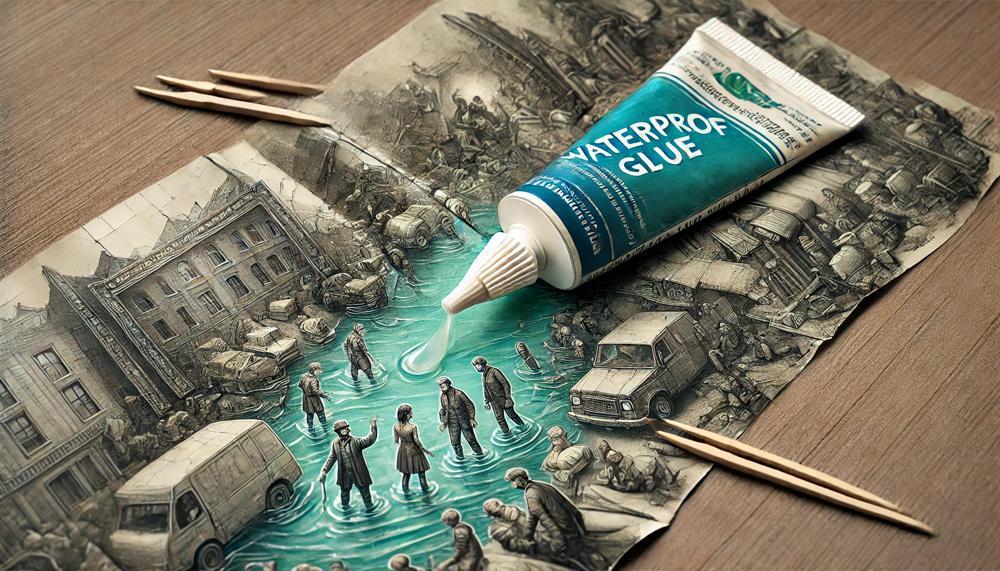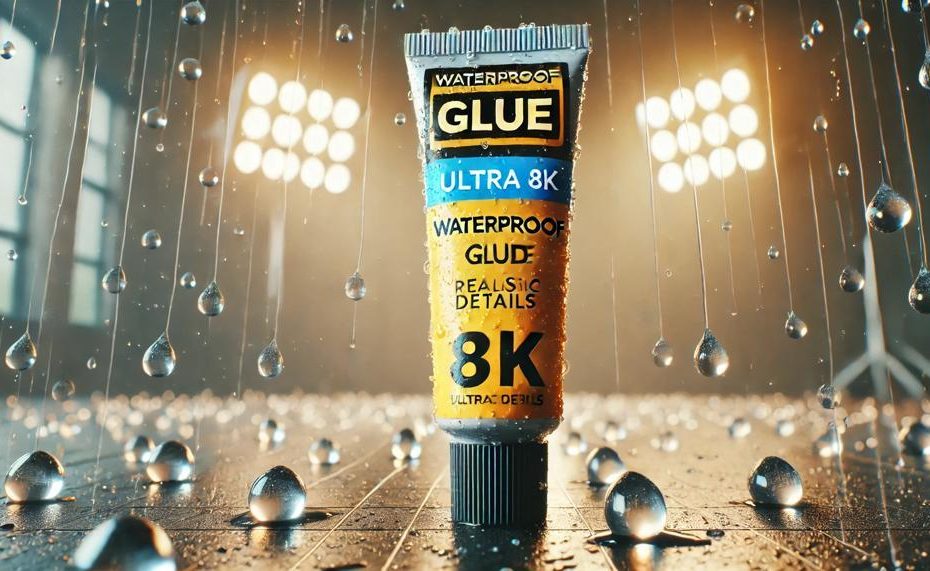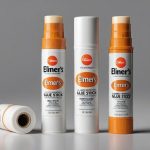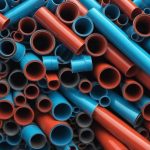Yes, glue can be waterproof. In fact, this is one of the most significant features that set certain adhesives apart, making them indispensable for various applications. While many types of glue can resist water to some degree, hot glue stands out for its remarkable waterproof properties.
Once hardened, hot glue becomes impenetrable to water and most chemicals, ensuring the bond remains intact even when fully submerged. However, it’s important to note that while hot glue is waterproof, its bond strength can vary based on the materials being adhered and the specific type of glue used.
Here are key takeaways about waterproof glue:
- Water Resistance: Hot glue is waterproof and remains impermeable even when submerged.
- Material Compatibility: The bond strength of hot glue depends on the materials being bonded.
- Durability: Once hardened, hot glue resists water and chemicals effectively.
- Limitations: Despite being waterproof, hot glue is not suitable as a sealant for outdoor or indoor projects due to its quick-drying nature.
- Effectiveness: No hot glue can create a completely waterproof bond underwater, but its durability can vary with different materials.
Understanding these aspects helps you choose the right glue for your needs, ensuring long-lasting and reliable results for your projects.
Table of Contents
Understanding Hot Glue
The short answer is yes, hot glue is waterproof but with caveats regarding its suitability for water-resistant projects. Here’s a detailed look at its properties and limitations:
Hot glue is indeed waterproof, remaining impermeable even when fully submerged. Once hardened, it resists water and many chemicals. However, its suitability for water-resistant projects hinges on several factors, including the type of hot glue used and the materials being bonded.
High-quality hot glues like polyurethane reactive (PUR) are better suited for water-resistant applications compared to conventional EVA-based hot glue. PUR adhesives offer stronger bonds and greater durability when exposed to moisture.
Key Considerations:
| Factor | Details | Recommendations |
| Type of Hot Glue | PUR adhesives are more effective for water resistance. | Use PUR for projects needing higher durability in wet conditions. |
| Material Compatibility | The effectiveness of the bond depends on the materials. | Test glue on materials before full-scale application. |
| Outdoor Use | Hot glue can deteriorate due to UV exposure. | Consider additional protective coatings or alternative adhesives for outdoor use. |
| Sealant Properties | Hot glue dries quickly and cannot be used as a waterproof sealant. | Use dedicated sealants for sealing purposes. |
Hot glue’s bond may weaken over time, especially when subjected to harsh conditions like UV radiation or constant immersion. Although it’s not the best option for creating completely waterproof bonds underwater, it can handle occasional water exposure.
For a reliable and durable adhesive in water-resistant projects, consider the specific requirements of your project and choose the type of hot glue accordingly.
Is Hot Glue Waterproof?
Hot glue is generally water-resistant but not entirely waterproof. This means it can withstand some moisture but is not suitable for projects involving prolonged exposure to water or heavy soaking.
Factors such as the type of hot glue, surface material, and application method significantly affect its waterproof capabilities. While some brands like Gorilla hot glue offer enhanced water resistance, they still may not hold up well under continuous water exposure or outdoor conditions.
Key Considerations for Using Hot Glue in Waterproof Projects
| Factors | Details | Implications |
| Type of Hot Glue | Different brands have varying levels of water resistance. For example, Gorilla hot glue is more water-resistant. | Choose a high-quality, water-resistant hot glue for better performance. |
| Surface Material | Porous materials like fabric or wood may not bond as effectively with hot glue in wet conditions compared to non-porous materials like plastic or metal. | Ensure the surfaces are compatible and well-prepared to enhance adhesion. |
| Application Method | Proper application technique, including ensuring a clean, dry surface and adequate glue coverage, is crucial. | Follow the manufacturer’s instructions for optimal results. |
| Exposure Duration | Short-term exposure to moisture is typically acceptable, but long-term or constant exposure can compromise the bond. | Avoid using hot glue for projects intended to be submerged or exposed to water for extended periods. |
| Environmental Conditions | Hot glue is not UV-resistant and may degrade with prolonged sun exposure. | Not recommended for outdoor projects or environments with direct sunlight. |
Waterproof vs. Water-Resistant
The primary difference between waterproof and water-resistant glue lies in their capacity to withstand water exposure over time. Waterproof glue is designed to provide a robust seal that remains unaffected by continuous or significant water exposure, making it ideal for outdoor and submersion applications.
In contrast, water-resistant glue can endure minor moisture and occasional splashes but is not suitable for environments with prolonged or intense water contact.
| Feature | Waterproof Glue | Water-Resistant Glue |
| Water Exposure | Handles continuous and heavy exposure; perfect for outdoor use and underwater applications. | Withstands light moisture and occasional splashes; not suitable for prolonged water exposure. |
| Usage | Ideal for marine projects, exterior repairs, and any application requiring a permanent, water-tight seal. | Suitable for indoor projects, light-duty repairs, and areas with occasional moisture contact. |
| Examples | Loctite Super Glue Liquid Professional | Gorilla Super Glue |
| Cost | Typically more expensive due to its advanced formulation for waterproofing. | Generally more affordable as it offers basic moisture resistance. |
Factors Affecting Hot Glue Waterproofing
Temperature plays a critical role in the waterproofing capabilities of hot glue. When temperatures fluctuate, hot glue’s thermoplastic nature causes it to expand and contract. This thermal expansion and contraction can compromise the integrity of the adhesive bond, making it less effective at repelling water.
| Temperature Increase | Temperature Decrease | Impact |
| When the temperature rises, hot glue softens and expands, potentially weakening its bond. | As the temperature drops, hot glue contracts, which can cause it to become brittle and crack. | This cyclical process of expansion and contraction can create small gaps or fractures in the glue, reducing its water-resistant properties. |
| For hot glue to maintain its waterproofing abilities, it should ideally be kept in environments with stable temperatures, avoiding extreme heat or cold. | ||

Additional Factors:
- Thermoplasticity: This inherent property allows hot glue to be reshaped when heated, but it also means the glue can lose its rigidity and seal when exposed to high temperatures.
- Material Compatibility: Some materials may exacerbate the impact of temperature changes on hot glue’s waterproofing abilities. For instance, metals can conduct heat, causing localized temperature increases that weaken the glue’s bond.
Conclusion
Hot glue is renowned for its waterproof properties, making it an invaluable adhesive for various applications. While many adhesives offer some level of water resistance, hot glue, especially when fully cured, stands out due to its impermeability to water and many chemicals. This characteristic ensures that the bond remains secure even when submerged.
However, the strength and effectiveness of hot glue depend significantly on the materials being bonded and the specific type of hot glue used. For instance, polyurethane reactive (PUR) hot glues provide superior water resistance and durability compared to conventional EVA-based glues, making them more suitable for projects exposed to moisture.
It’s crucial to note that while hot glue is water-resistant, it is not an ideal sealant for prolonged water exposure or outdoor projects. The bond might weaken over time under constant immersion or harsh conditions such as UV radiation. For these scenarios, a dedicated waterproof sealant would be more appropriate.
In essence, hot glue is a reliable choice for projects needing occasional water exposure but should be selected carefully based on the materials involved and the specific demands of the application.






